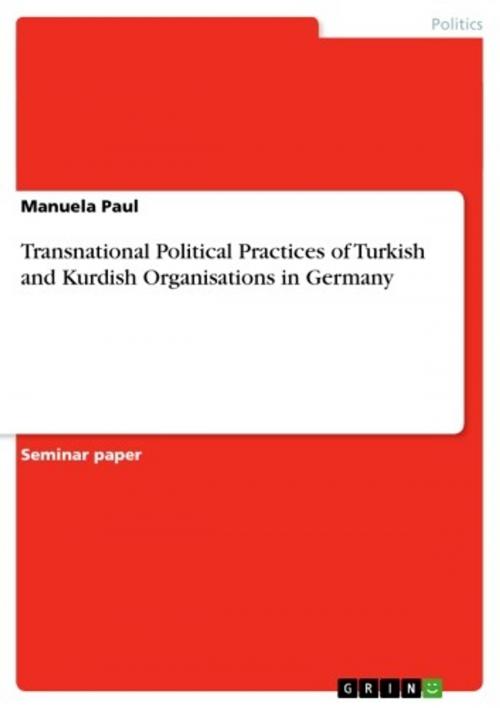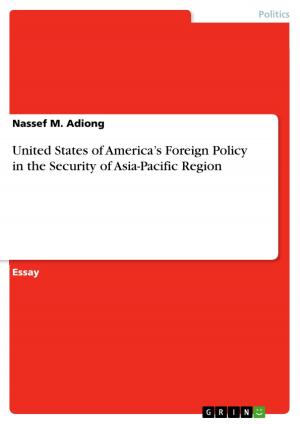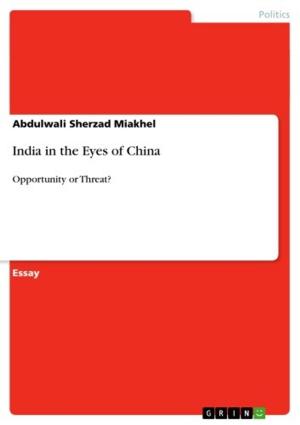Transnational Political Practices of Turkish and Kurdish Organisations in Germany
Nonfiction, Social & Cultural Studies, Political Science, International, Foreign Legal Systems| Author: | Manuela Paul | ISBN: | 9783640289059 |
| Publisher: | GRIN Publishing | Publication: | March 13, 2009 |
| Imprint: | GRIN Publishing | Language: | English |
| Author: | Manuela Paul |
| ISBN: | 9783640289059 |
| Publisher: | GRIN Publishing |
| Publication: | March 13, 2009 |
| Imprint: | GRIN Publishing |
| Language: | English |
Seminar paper from the year 2008 in the subject Politics - Political Systems - Germany, grade: 1,0, Bilgi University ?stanbul (Bilgi University ?stanbul, Institute for European Studies), course: Turkish Politics and Foreign Policy, 14 entries in the bibliography, language: English, abstract: [...] Since the beginning of Turkish and Kurdish immigrants arriving in Germany as so called guest workers in the 1960s, they have established multiple organisations ranging from totally apolitical associations to the ones with a political focus. The approximate number is estimated at about 1.500 Turkish and Kurdish organizations in the country (see Østergaard-Nielsen 2001, 270). These organisations can be differentiated between having their focus on immigrant or homeland politics. Whereas immigrant problems on the agenda of an organisation involves politics to improve the situation in the receiving country, such as gaining political, economic and social rights, homeland politics imply the political connections of organisations maintained to the home country in order to affect the domestic or foreign policy (see Østergaard-Nielsen 2001, 262). Although since the 1970s there has been a certain shift from engagement in homeland politics to a stronger political involvement in immigration and German politics in general, Brady mentions that the attempt to influence Turkish politics among the immigrants might have actually increased (see Brady 2004, 49f.). Moreover, Ögelman states that most Turkish and Kurdish organizations in Germany have based their interests on homeland conflicts (see Ögelman 2003, 164). Against this background the paper focuses on the homeland attachments of Turkish and Kurdish political organizations in Germany. It aims to inquire about the forms of homeland ties established and furthermore discusses the reasons for migrants' mobilisation and participation on homeland political issues. First, I will give an historical overview on the major stages of transnational politcs' development since the beginning of labour recruitment from Turkey in the 1960s. Then I will go on to describe the transnational ties of Turkish organisations existing in Germany. Due to the high number and the diversity of Turkish organisations in Germany and the importance of the transnational space for the Kurdish movement (see Argun 2001, 125), this paper will particularly focus on the establishment and the ties of Kurdish organisations in Germany. In the third part of this paper I outline the reasons for the establishment of these connections considering Turkey's and Germany's influence.
Seminar paper from the year 2008 in the subject Politics - Political Systems - Germany, grade: 1,0, Bilgi University ?stanbul (Bilgi University ?stanbul, Institute for European Studies), course: Turkish Politics and Foreign Policy, 14 entries in the bibliography, language: English, abstract: [...] Since the beginning of Turkish and Kurdish immigrants arriving in Germany as so called guest workers in the 1960s, they have established multiple organisations ranging from totally apolitical associations to the ones with a political focus. The approximate number is estimated at about 1.500 Turkish and Kurdish organizations in the country (see Østergaard-Nielsen 2001, 270). These organisations can be differentiated between having their focus on immigrant or homeland politics. Whereas immigrant problems on the agenda of an organisation involves politics to improve the situation in the receiving country, such as gaining political, economic and social rights, homeland politics imply the political connections of organisations maintained to the home country in order to affect the domestic or foreign policy (see Østergaard-Nielsen 2001, 262). Although since the 1970s there has been a certain shift from engagement in homeland politics to a stronger political involvement in immigration and German politics in general, Brady mentions that the attempt to influence Turkish politics among the immigrants might have actually increased (see Brady 2004, 49f.). Moreover, Ögelman states that most Turkish and Kurdish organizations in Germany have based their interests on homeland conflicts (see Ögelman 2003, 164). Against this background the paper focuses on the homeland attachments of Turkish and Kurdish political organizations in Germany. It aims to inquire about the forms of homeland ties established and furthermore discusses the reasons for migrants' mobilisation and participation on homeland political issues. First, I will give an historical overview on the major stages of transnational politcs' development since the beginning of labour recruitment from Turkey in the 1960s. Then I will go on to describe the transnational ties of Turkish organisations existing in Germany. Due to the high number and the diversity of Turkish organisations in Germany and the importance of the transnational space for the Kurdish movement (see Argun 2001, 125), this paper will particularly focus on the establishment and the ties of Kurdish organisations in Germany. In the third part of this paper I outline the reasons for the establishment of these connections considering Turkey's and Germany's influence.















